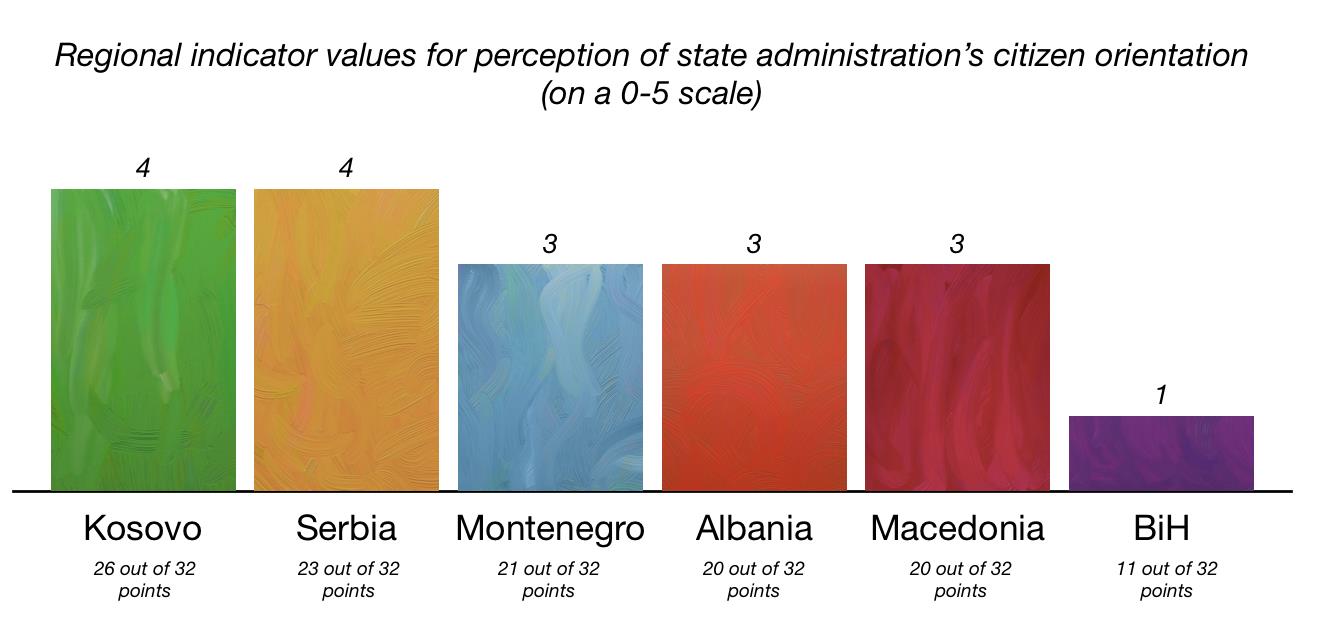(Positive) Public perception of state administration’s citizen orientation
Perceptions are explored using a survey targeting the general public (aged 18 and older) of 6 Western Balkan countries (WB). The assessment included analysis of public perception data which covered various aspects of awareness, efficiency, digitalization and feedback mechanisms of service delivery. Moreover, researchers analysed perception data on availability, awareness and usage of e-services. In addition, citizens’ knowledge about initiatives for simplification of administrative services was analysed together with the question of whether such initiatives have led to improvement of service delivery and an increase in efficiency.
Survey outcomes show a generally positive public perception towards administrative services with Kosovo and Serbia being front runners, whereas BiH falling back significantly. On average half of citizens across all countries are aware of government administrative simplification efforts, and the vast majority of which consider that such efforts have improved administrative service delivery.
As such, there is generally strong agreement among the citizens of WB that dealing with the administration has become easier and time needed to obtain administrative services has decreased; with Kosovo being ahead, whereas BiH scoring the lowest. At least half of the citizens recognize administrations’ efforts to move towards digital government, with Macedonia and Serbia being well ahead of other countries.
Almost half of region’s citizens are aware of the availability of e-services provided by their respective administrations. Kosovo, Albania and Macedonia mark the countries that rank the highest in this regard, while BiH is once again ranked significantly lower. Out of those citizens who are aware, the majority claim to be informed on the way to use these services, with the share being particularly high in Serbia. Yet, only a small share of citizens actually uses these services, the share being highest in Kosovo and Serbia particularly in comparison to BiH and Albania. Nevertheless, the vast majority of citizens who have used e-services perceive them as user-friendly.
Regardless the notable progress in terms of service delivery, the administrations in the WB lack strong cooperative relationship with citizens when it comes to availability for suggestions. With the exception of Albania, the share of citizens who claim to have been asked by the government for proposal on how to improve administrative services is relatively low. However, out of those who consider so, the vast majority agrees that their proposals have been used to improve services.
Finally, it should be noted that for many questions, the percentage of citizens who responded with "don't know/no opinion" across the region, and particularly in Montenegro, is relatively high, ranging from a quarter to more than a third of respondents.
See the results by country here.
(Positive) Public perception of state administration’s citizen orientation
Perceptions are explored using a survey targeting the general public (aged 18 and older) of 6 Western Balkan countries (WB). The assessment included analysis of public perception data which covered various aspects of awareness, efficiency, digitalization and feedback mechanisms of service delivery. Moreover, researchers analysed perception data on availability, awareness and usage of e-services. In addition, citizens’ knowledge about initiatives for simplification of administrative services was analysed together with the question of whether such initiatives have led to improvement of service delivery and an increase in efficiency.
Survey outcomes show a generally positive public perception towards administrative services with Kosovo and Serbia being front runners, whereas BiH falling back significantly. On average half of citizens across all countries are aware of government administrative simplification efforts, and the vast majority of which consider that such efforts have improved administrative service delivery.
As such, there is generally strong agreement among the citizens of WB that dealing with the administration has become easier and time needed to obtain administrative services has decreased; with Kosovo being ahead, whereas BiH scoring the lowest. At least half of the citizens recognize administrations’ efforts to move towards digital government, with Macedonia and Serbia being well ahead of other countries.
Almost half of region’s citizens are aware of the availability of e-services provided by their respective administrations. Kosovo, Albania and Macedonia mark the countries that rank the highest in this regard, while BiH is once again ranked significantly lower. Out of those citizens who are aware, the majority claim to be informed on the way to use these services, with the share being particularly high in Serbia. Yet, only a small share of citizens actually uses these services, the share being highest in Kosovo and Serbia particularly in comparison to BiH and Albania. Nevertheless, the vast majority of citizens who have used e-services perceive them as user-friendly.
Regardless the notable progress in terms of service delivery, the administrations in the WB lack strong cooperative relationship with citizens when it comes to availability for suggestions. With the exception of Albania, the share of citizens who claim to have been asked by the government for proposal on how to improve administrative services is relatively low. However, out of those who consider so, the vast majority agrees that their proposals have been used to improve services.
Finally, it should be noted that for many questions, the percentage of citizens who responded with "don't know/no opinion" across the region, and particularly in Montenegro, is relatively high, ranging from a quarter to more than a third of respondents.
See the results by country here.





